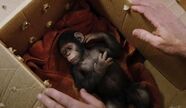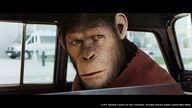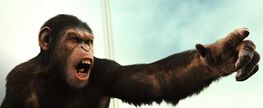's 1968 film "Planet of the Apes" is a fable full of pessimism: thousands of years later, on Earth, human civilization has long since died out, orangutans have evolved into highly intelligent creatures to establish their civilization, while humans gradually It degenerated into a beast, lost the ability to speak, and was kept in a cage by orangutans. The '60s were a time of rebellion and despair, which is why such cynical films were born. In today's world, many people still can't see hope. From the unquenchable European debt crisis to the Arab Spring in North Africa, from the gangsters who smashed stores on the streets of London to the demonstrations on Wall Street that lack a platform, there is a faint smell of gunpowder in the air. and deep dissatisfaction. The most dissatisfied are the audiences of Chinese cinemas. For the first half of this year, the screen is full of mentally handicapped domestic films or foreign films under the banner of blockbusters. Fortunately, at the tail end of this October, there is finally a film that feels heartfelt, objectifying people's dissatisfaction to the screen in an ironic and self-deprecating way. As the sequel (prequel) to the 1968 film, "Rise of the Planet of the Apes" revives the spirit of revolution and rebellion in the 1960s, and also continues the cynicism that oppresses the arrogance, mercenary and civilization of today's human beings in the way of the entertainment industry. Sex is a big question mark.
Despite being a sequel, "Rise of the Planet of the Apes" isn't a conventional film that, like many mediocre films, flaunts a little bit of cleverness within a set frame to please today's audience. On the contrary, in addition to continuing the inherent spiritual connotation of the subject matter, this new work has made bold innovations, giving the film great originality. Although the "Ape" series of movies in the 1960s and 1970s can be called Hollywood sci-fi classics, in today's view, they seem to have rough special effects, slow plots, and insufficient emotional detail. Today, the "Rise of the Planet of the Apes" we see is a classic. This is a film with advanced technology, a sense of rhythm of the times, and full of emotion; what is more different is that the original film focused on allegory, while today's film focuses on characters and actions, creating a film that reflects today's spirit of the times, and A new hero with a full personality - the orangutan "Caesar". Rather than saying that "Rise of the Planet of the Apes" has resurrected the "Ape" series, it is better to say that it has completely remodeled the series. This transformation, perhaps only Christopher Nolan's "Batman: War Hour" has the original comic humorous color. The Batman series is comparable.
"Rise of the Planet of the Apes" is the kind of film that has only one focus in the whole film, and this focus is the orangutan "Caesar". Whether it is the human protagonist Will who "raised" Caesar, or the fellow orangutans of Caesar, they are all inconspicuous. The foils, and even the movie's clever plot and well-designed action scenes, can't be separated from Caesar as a separate focus. Caesar is one of the most vivid animal protagonists we've ever seen in a movie, with a mix of humanity and beast in him, a natural leader, and destined to be "the Che Guevara of the orangutans."
Thanks to the ever-advancing computer effects, today we don't have to put up with a human-played orangutan making a crappy look through a make-up prop. Caesar is played by a real person, without makeup, but wearing a special hat. A tiny camera inside captures every move of the actor's expressions in detail, and then the actor's movements and the captured expressions are combined into a complete computer. role performance. The Caesar we see on the screen today has such a human-like expression, and his face is so colorful with joy, anger, sorrow and joy. This is something that no animal actor or a human actor wearing make-up can perform. Caesar is a good comparison to Gollum in The Lord of the Rings, both using Weta Workshop's expression capture technology and performed by the same actor, Andy Serkis. Gollum is already a classic among computer-generated characters, and his every move reflects a crazy character mixed with timidity and greed; Caesar's temperament and facial expressions are more colorful, and this character erases the singleness of his personality. Sex, towards diversity and depth, which may be the result of technological progress bringing more space to Serkis's performances.
Caesar is an orangutan, but more human (although it would be more arrogant to call the noble qualities of an orangutan human in such a film, but we can't find a better word), Just like many people in the movie have more animal nature. When the proportions of the human nature in the orangutan and the animal nature in the human are reversed, things don't make sense, and "people" have to make the change. Caesar is an orangutan with a very high IQ. Living with humans for a long time has made him understand human habits. He has extraordinary courage and leadership skills, which makes him a natural leader to make this kind of "change". The good news is that the "uprising" of the orangutans was not sloppily represented as a farce of a great melee between the orangutans. Caesar went from the initial attachment to humans to his farewell to humans, and then finally decided to lead the orangutans to rebel and gain freedom. The movie went on for a long time. In just a few minutes, Caesar went through a complicated mental journey. The incongruity between the bestiality and the humanity of Caesar is revealed early in the film, with his ape-like body but intelligent facial expressions and eyes, a bizarre conflict that unnerves the audience from the very beginning. Caesar himself quickly became uneasy. He was initially attached to Will, the "master", and had a happy and happy time with Will in the forest, but his eyes completely dimmed when he glimpsed the collar around his neck for a split second. , "Am I a pet?" he asked Will in sign language. The first thing that a creature of reason and intelligence seeks is his freedom. Then Caesar soon discovered that his unfreedom was not just because he wore Will's collar, but because he was an ape, in a world dominated by humans, under the oppression of the entire civilization system, animals. The shelter is the representative of this system. And it wasn't just himself who was oppressed, but the entire race. Caesar wanted to organize them to resist, but an orangutan who had been in a circus in the shelter reminded him - "Apes are stupid", Caesar found that if Only his own "awakening" can't help, so he stole the experimental drug No. 112 that can improve the intelligence of the orangutans, and changed the apes from "them" to "them". From seeking individual freedom to leading the emancipation of the race is only the subjective motive of Caesar to lead the chimpanzee revolution, but the objective condition is that the system that rules the chimpanzee is unjust. Humans have high intelligence, but they do not necessarily have high "humanity". Scum like shelter guards and drug laboratory bosses are inferior to orangutans. This makes the legitimacy of human rule questioned by Caesar, and also Justified support for his resistance. On the contrary, the group of apes led by Caesar maintained a high level of self-discipline and organization from the beginning, especially when the gorillas When Buck sacrificed himself to save Caesar, he showed a noble quality beyond ordinary humans, which not only made the audience fully identify with the orangutan group, but also showed that this group may have a better future than humans. Obtaining freedom is only the first step that Caesar led the orangutans to take. As a group (race) with wisdom and excellent quality, they will not be satisfied with just living in the mangrove forest, facing the degenerate human city across the sea. At the end of the film, the shot of Caesar standing at the top of the giant tree overlooking San Francisco is as part of a farewell as a provocation and a preview - what will be his goal next.
Judging from the title of the film, "Rise of the Planet of the Apes" must be a movie to be made into a sequel, because in this episode, the orangutans are far from "rising". From the perspective of the plot succession, from this episode Caesar leads the orangutan to obtain freedom to the world ruled by the orangutan in "Planet of the Apes", there are at least a few episodes of plot capacity in between. Rise of the Planet of the Apes is off to a great start for this new series, will it go further next episode and become the series' Dark Knight? We will wait and see.
View more about Rise of the Planet of the Apes reviews











